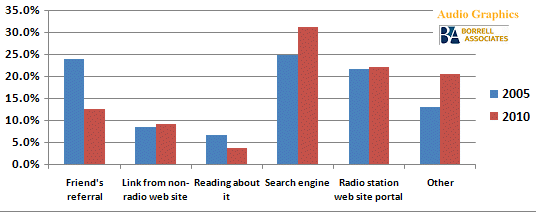 Analytics, Metrics and Music for the Radio Industry
Analytics, Metrics and Music for the Radio Industry
 An Indie Artist Pipeline to Internet Radio
An Indie Artist Pipeline to Internet Radio
 Radio Industry ROI Strategy
Radio Industry ROI Strategy
 A New Breed of Indie Artists
A New Breed of Indie Artists
No "Radio" in Online Search for Radio
It's safe to say that the radio industry is now devoting energy online. How much depends on the radio group. Certain companies are visibly pushing the industry in a digital direction.
The industry should be proud of CBS, which leads the digital move with a variety of initiatives that we won't get into here. Clear Channel is focusing on tightening relationships with consumers who use mobile, while Townsquare Media leads in managing use of web sites.
| "If a station does chase national audience online it must employ the power of search engines." |
We also have a rush - and I do mean "rush" - toward social media and apps. Time is going to prove whether either is the right place to put your eggs today. It's not apparent that anyone is paying attention to the analytics and metrics required to measure social media, to prove if it's worth the time. Apps are still a way to serve only a very small segment of your audience. |
I also don't see this major question being asked: Where should your radio station's online audience come from? If the answer is "ADI," you've narrowed the pool of potential audience members, guaranteeing that web site visits and people finding its stream will be an insignificant number. In this case, if the radio industry becomes analytics-savvy it will produce revenue by delivering local data to local advertisers. I just don't see that happening soon. (The upcoming digital conventions do not give analytics or metrics a place on their respective agendas.)
The other choice for "where your online audience comes from" is national, or global. For music stations this brings a new set of problems called performance royalty fees (which we, also, won't get into here).
To keep this simple let's focus on drawing a national audience to your station's web site and stream.
The graph represents reponse to a February 2010 Audio Graphics/Borrell Associates poll of online radio listeners, compared to that for the same question asked in 2005: "What most helps you find new Internet radio stations?"

Search engines remain the leading source for sending people to your web site. Which brings up another question: Why is it that no radio broadcaster is in the top-10 returns when a person searches for "radio stations" or "internet radio stations" on Google or Yahoo? (MSN's "Bing" is used to power Yahoo!. Returns on both are similar.)
 |
 |
Rank |  |
Keyword - "Radio Stations" | |
 |
 |
1 |  |
radio-locator.com | |
 |
 |
2 |  |
radio-locator.com/cgi-bin/page?page=states | |
 |
 |
3 |  |
onlineradiostations.com | |
 |
 |
4 |  |
onlineradiostations.com/radio-stations | |
 |
 |
5 |  |
onlineradiostations.com/radio-shows/view-issue.html | |
 |
 |
6 |  |
onlineradiostations.com/online-radio.html | |
 |
 |
7 |  |
onlineradiostations.com/music-links.html | |
 |
 |
8 |  |
onlineradiostations.com/search.html | |
 |
 |
9 |  |
onlineradiostations.com/radio-stations/jazz.html | |
 |
 |
10 |  |
radiorow.com |
 |
 |
Rank |  |
Keyword - "Internet Radio Stations" | |
 |
 |
1 |  |
music.aol.com/radioguide/bb | |
 |
 |
2 |  |
radiorow.com | |
 |
 |
3 |  |
onlineradiostations.com | |
 |
 |
4 |  |
onlineradiostations.com/radio-stations | |
 |
 |
5 |  |
onlineradiostations.com/online-radio.html | |
 |
 |
6 |  |
radiotower.com | |
 |
 |
7 |  |
live365.com | |
 |
 |
8 |  |
live365.com/scp | |
 |
 |
9 |  |
live365.com/genres/rock | |
 |
 |
10 |  |
live365.com/genres/jazz |
Note: Google changed search algorithms two weeks ago. This is the first time that I've seen a single web site repeatedly showing up in the top 10 returns. I imagine the above anomaly will soon be corrected.
 |
Yahoo! |  |
Rank |  |
Keyword - "Radio Stations" |
 |
 |
1 |  |
radio-locator.com | |
 |
 |
2 |  |
onlineradiostations.com | |
 |
 |
3 |  |
radiostations.com | |
 |
 |
4 |  |
en.wikipedia.org/wiki/Radio_broadcasting | |
 |
 |
5 |  |
music.aol.com/radioguide | |
 |
 |
6 |  |
pandora.com | |
 |
 |
7 |  |
radiorow.com | |
 |
 |
8 |  |
radiotower.com | |
 |
 |
9 |  |
radio-locator.com/cgi-bin/page?page=states | |
 |
 |
10 |  |
ontheradio.net/stations.aspx |
 |
Yahoo! |  |
Rank |  |
Keyword - "Internet Radio Stations" |
 |
 |
1 |  |
live365.com | |
 |
 |
2 |  |
pandora.com | |
 |
 |
3 |  |
shoutcast.com | |
 |
 |
4 |  |
bbc.co.uk/radio | |
 |
 |
5 |  |
music.aol.com/radioguide | |
 |
 |
6 |  |
radiotower.com | |
 |
 |
7 |  |
radio-locator.com | |
 |
 |
8 |  |
en.wikipedia.org/wiki/Internet_radio | |
 |
 |
9 |  |
onlineradiostations.com | |
 |
 |
10 |  |
radiorow.com |
Digest these lists. They represent what a person sees first when looking for radio, online. Isn't it about time that some radio industry names were to appear?
If a station does chase national audience online it must employ the power of search engines. Depending on your broadcast signal to generate visitors limits online potential. With the competition for radio that's out there, limiting anything is not what you want to do when trying to get in front of a person searching for radio online.








